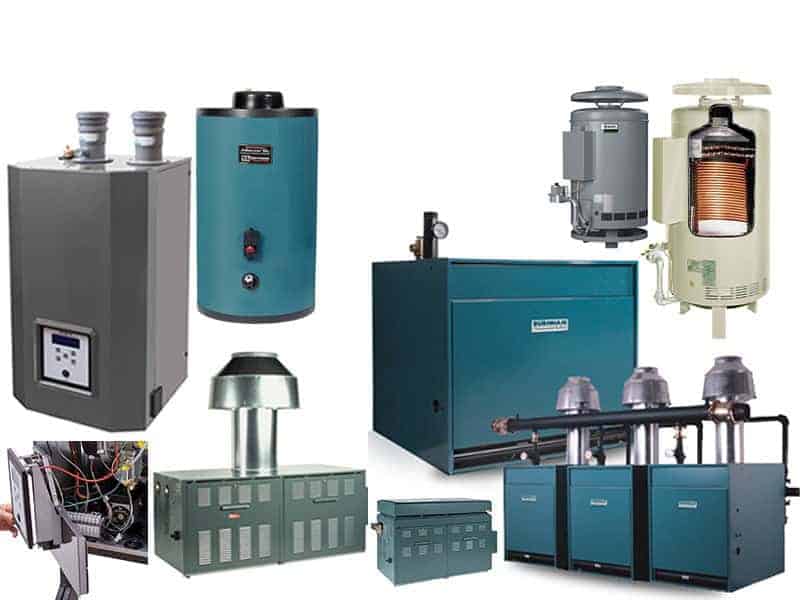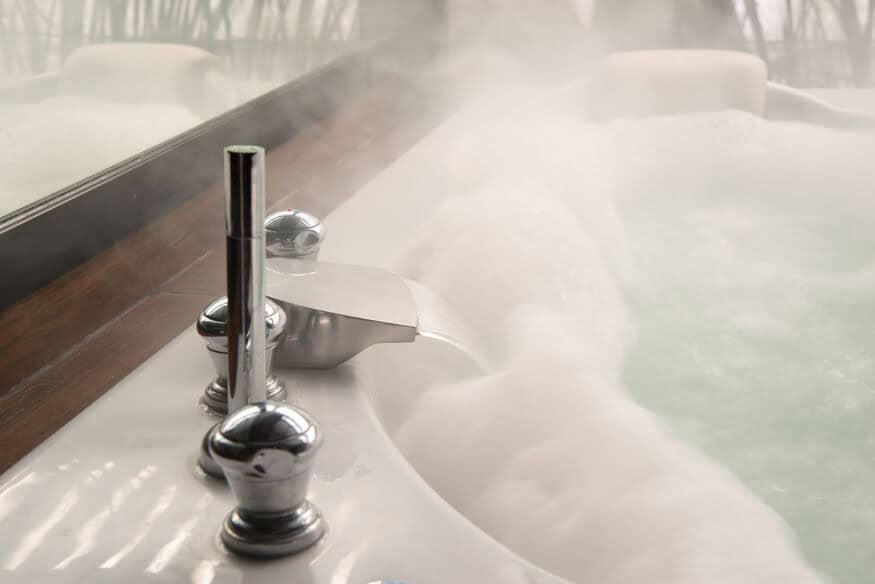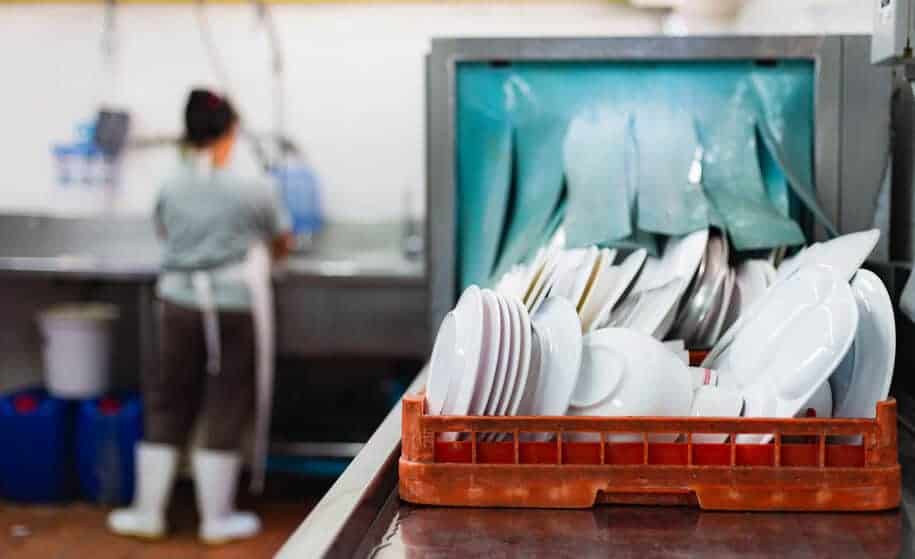When people think of boilers, they often envision coal-filled rooms from the Industrial Revolution. However, the fact remains that boiler heating systems are still in use, even in this modern world.
Commercial boiler heating systems come in a huge variety of sizes and designs. Generally speaking, they are sealed combustion chamber systems that use heat from a fuel source to produce steam or hot water for domestic hot water uses (such as drinking, bathing, laundry, food preparation, etc.), space heating, or, in rare cases, generating electricity. In this guide, we’ll break down exactly what you need to know about boilers and how they might be the perfect solution for you and your business!

How Do Boilers Work?
A commercial boiler operates by burning various fuels, like natural gas (the most common), propane, oil, coal, or other types, depending on the type of boiler. Electric boilers also exist, but they are much more expensive to run than gas units. The heat energy is transferred via a heat exchanger, burner, or coil and used to heat water or other fluids sealed within the boiler’s pipes and compartments. The resulting steam or hot water heats the pipes or radiators, which act as a heat source or power source for your building or equipment.
Seems simple, right? But trust us, there’s more to boilers than just being the ultimate water heaters!
Boiler Heating System Components
The way a boiler heating system works can depend on the type and model of the boiler, and the exact components may vary. To simplify the discussion, we’ll focus on the most common type of boiler: the water-tube boiler.
- Heat Exchanger: These systems operate via, you guessed it, heat exchange. Water-tube and fire-tube are both heat exchange systems. With water-tube boilers, a closed system containing water-filled metal pipes (think old-fashioned radiators) is heated as the water passes through them. (In contrast, with fire-tube boilers, exhaust gases pass through the tubes.)
- Burner: This refers to the boiler’s water heater. It produces the flame that heats the water in the boiler.
- Steam Drum: Located above the top of the water tubes, the steam drum stores steam created from the heat and separates it from water.
- Water Drum: The water drum, aka the mud drum, located at the bottom of the boiler, collects sediments from the water tubes, which are then removed to ensure the boiler’s efficiency. Removing this sediment is referred to as the “blow down” process. In older models, this process would have to be done manually and nearly daily, but luckily technology has improved and now most boiler models are equipped with automatic blow-down functions.
- Downcomers and Risers: Downcomers are pipes that allow water to flow down from the steam drum to the mud drum or water drum. Risers are the pipes through which the water flows upwards due to the density difference between the hot and cold water.
- Superheater: This component utilizes residual heat to increase the steam’s temperature, resulting in superheated steam and enhancing the boiler’s heating efficiency.
- Economizer: The economizer utilizes the waste heat from flue gases to preheat the feedwater before it enters the boiler, thereby conserving energy.
- Air Preheater: As its name implies, the preheater uses the heat from the flue gases to heat the air used for fuel combustion.
- Evaporator: This is the part of the boiler where the feed water is converted into steam through heat transfer from the tubes.
- Feed Pump: This pumps the water into the boiler for conversion into steam.
- Pressure Relief Valve: A safety mechanism designed to prevent accidents and damage, this valve expels excess pressure when the system registers dangerously high pressure levels.
- System Controls and Gauges: These include pressure gauges, water level controls, and temperature controls to monitor and control various aspects of boiler operation.

Different Types of Boiler Heating Systems
Most modern boilers are water-tube, fire-tube, high-efficiency condensing, or a combination of these types.
Water-Tube Boilers
A water-tube boiler propagates fire-heated water through tubes surrounded by hot gas, which turns the water into steam. This design has several advantages, including handling higher pressures, quick response to load changes, and a high steam generation rate.
Fire-Tube Boiler
A fire-tube boiler also produces steam for power, but it works the opposite way to a water-tube boiler. Instead of running water through tubes heated by external gases, a fire-tube boiler runs heated gas pipes through a water tank to create steam.
Fire-tube boilers have a limit on the pressure they can handle, and they are also less efficient than water-tube boilers for large-capacity or high-pressure applications.
High-Efficiency Condensing Boiler
A high-efficiency condensing boiler is designed to use the latent heat of water vapor (which is usually wasted in traditional boilers) in the combustion process to improve boiler efficiency.
In a condensing boiler, the heat exchanger has two phases. Like a traditional boiler, the primary phase heats the water to a specific temperature. But it’s the second phase that makes a condensing boiler distinctive: this is where the hot exhaust gases are condensed into water vapor.
As the gas cools, it releases latent heat, which preheats the cold water entering the boiler. This process allows the boiler to extract more heat from less fuel, conserving energy and saving you money on fuel costs.
High-efficiency condensing boilers can achieve an efficacy of over 90%, compared to a 70%-80% efficiency rating for non-condensing boilers. These boilers are also more environmentally friendly, as they reduce the amount of fuel needed and thus the amount of harmful gases released into the atmosphere.
Combination Boiler
A combination boiler heating system, often referred to as a combi boiler, combines space heating and domestic hot water into a single compact unit. However, the combi boiler can only do one of these functions at a time. For example, if the combi boiler is providing radiant heat, and someone turns on the hot water in the bathroom, the combination boiler will stop space heating to provide the new hot water needed.
Combi boilers might not be the best choice for buildings with multiple bathrooms or low water pressure. In these cases, having a hot water cylinder or system with a storage tank can ensure that multiple taps can dispense hot water simultaneously.

Which Boiler Heating System to Use?
Boilers are primarily used to provide radiant heat in commercial buildings, although they can also be used to heat water. Conventional, hydronic heating boiler systems are used the most in larger properties with high demand. With advancements in technology, high-efficiency condensing boilers are quickly becoming the most ideal choice, and there’s an abundance of models available for both space heating and water heating uses.
Boiler vs. Water Heater
While boilers and water heaters seem to do essentially the same thing, they are used in very different ways. Water heaters are designed to produce and store hot water in a storage tank for domestic and commercial uses, including laundry, food prep, washing dishes, and bathing.
Boiler heating systems can also produce domestic hot water, but they cannot store it for later use. The boiler’s heated water or steam is used as it is made. Additionally, a boiler can only be used for one function. For example, a boiler may heat a pool, but you will need an additional boiler if you also need radiant heat.
Want to Keep Your Boiler in Good Shape?
The average lifespan of system boilers is 15 to 20 years. Even with regular maintenance, replacing older systems with newer options is a good idea to increase efficiency and save on energy costs. Places that have long, cold winter months or cooler climates may want to consider upgrading.
Always remember that boilers are high-pressure systems that contain extremely hot water and steam! If anything were to malfunction in your system, you could be at risk of burns, injury, or property damage. So, just as you should always call a trained technician to handle your water heater problems, you should only entrust your boiler repair to professionals.
The components of a boiler system seem relatively simple to understand, but many critical pieces must be in working order for the boiler to run smoothly and safely. It’s easy for an untrained eye to overlook something significant, which can lead to more issues down the road. Always use a professional to perform maintenance on your boiler and water heating equipment.
It’s essential to understand the basics of boilers and water heaters to make an informed choice. Don’t know where to start? Contact our trained professionals at Reliable Water Services (800-356-1444) for expert recommendations tailored to your business needs. We’re happy to help you select the ideal water heating system for your commercial application.